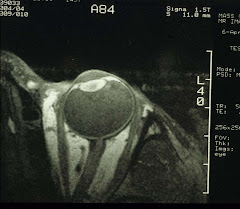 [Three major types of cataracts, cortical, nuclear, and subcapsular.
[Three major types of cataracts, cortical, nuclear, and subcapsular.Occasionally, numerous vacuoles can be seen in the cortex that eventually evolve into opacities. In the image above, light comes in from the right. ]
Whenever a doctor informs an elderly patient of the presence of cataracts, the patient will inevitably asks "what do I do now?". His/her real question is "what can I do to reverse or remove the cataracts without surgery". And the honest answer is "nothing you can do". Since age-related cataracts are caused by cumulative events leading up to irreversible protein aggregation and disruption of cellular integrity, there is nothing in the form of eyedrops that can repair these damages.
What about preventing cataracts from further progression? Perhaps, if the current thinking of the causative factor of age-related cataracts, oxidative stress, holds up. Oxidative stress has been blamed for many human illnesses and is becoming a favorable catch phrase for the for-profit anti-aging industry. There is nothing wrong as far as oxidation and cataractogenesis. In fact, hydrogen peroxide in relatively high concentrations has been discovered in the aqueous humor of the human eye. And solar radiation of the lens, particularly that from the ultraviolet, starts soon after birth. Logically, anti-oxidants should then retard the progression of cataracts. The problem is: "which ones that work". This is where the unproven therapeutics with fraudulent claims come in. Any proof of efficacy must be based on large-scale clinical trials and yet, none have been done thus far. On the other hand, dietary intake balanced with natural food produce rich in anti-oxidants is not a bad idea. Stay out of the sun, if you remember to take your vitamin D or wear UVA and UVB-blocking sunglasses.
Surgery? Sure, when the decreasing visual acuity meets the screen guidelines. Cataract extraction is a low-risk highly effective procedure. However, the outcome will depend on (1) the skill and the experience of the surgeon; (2) the status of the macula/retina; (3) structural integrity of the eye globe; (4) underlying systemic diseases if any; (5) management of interim and final binocular vision; and (6) possible complications and treatments. A pre-op consultation with your trusted ophthalmic surgeon is of course indispensable.











2 comments:
Cataract is one of the serious eye problems. I thought I had this disease when I experienced itchiness and blurred vision. So I consulted several optometrists in Indianapolis for prevention. I felt relieved to find out that I only had dry eyes. And they did treatment to remove the dryness. But I was warned that cataracts can develop from poor eye care.
"Cataracts can develop from poor eye care"
Perhaps. I'd say more from poor body care by, e.g., developing diabetes, exposing to radiation, having poor nutrition, etc. Or, not aging gracefully, so to speak.
Dry eye indeed can blur your vision that simulate the symptoms of cataracts except they are transient. Glad to know you are under good care.
Post a Comment